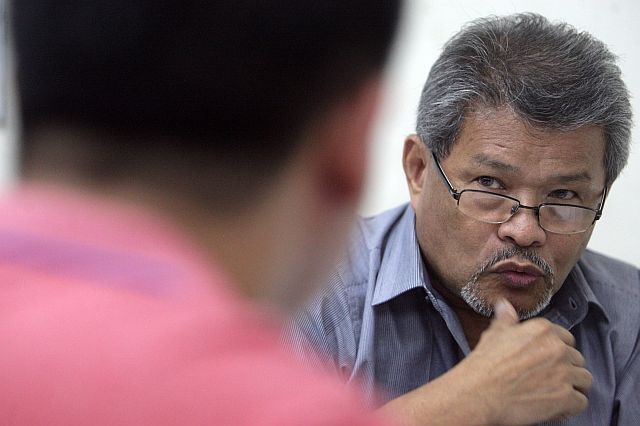
Lawyer Leo Villarino, Commission of Human Rights chief investigator, answers questions about extrajudicial killings during an interview with Cebu Daily News senior reporter Ador Vincent Mayol. (CDN PHOTO/TONEE DESPOJO).
THE chief investigator of the Commission on Human Rights in Central Visayas (CHR-7) refuted claims that there are no extrajudicial killings in the country.
“It’s premature to make any conclusions for now. There has been no official pronouncement or finding to prove that there are no extrajudicial killings,” said Leo Villarino in response to a statement of Senator Vicente “Tito” Sotto III.
While the police claim that drug suspects killed in their operations tried to engage them in a shootout, Villarino said these remain to be accusations.
Over 300 suspected cases of extrajudicial killings (EJK) in the region are being monitored by CHR-7 since late May.
Of the number, 35 cases are under formal investigation by CHR-7, as the families of other alleged EJK victims have not filed complaints against concerned police operatives.
“It’s too early to come up with any statement on whether or not there are extrajudicial killings,” Villarino said.
Amid the rising body count in the Duterte administration’s war on illegal drugs, Senator Sotto on Thursday said reports of EJK in the Philippines were but mere conjectures.
Speaking before about a hundred policemen in Cebu yesterday, the Senate majority leader said drug suspects who were killed by the police comprised just five percent of statistics in the government’s illegal drugs campaign.
Based on the records of the Philippine National Police (PNP), at least 37,346 antidrug operations were conducted nationwide from July 1 to Dec. 1.
According to the records, there were 38,587 drug suspects arrested while 2,004 were killed by operatives.
There were also 3,841 other drug suspects who were gunned down by unknown assailants.
Sotto, however, did not mention those killed by unidentified persons since President Rodrigo Duterte assumed office.
Death penalty call
To help President Duterte in eradicating illegal drugs, Sotto reiterated calls to reimpose death penalty but only for high-level drug traffickers who are found guilty by the trial court.
In 2014, Sotto sought the revival of the death penalty law through lethal injection through Senate Bill No. 2080, which proposed to repeal Republic Act No. 9346 or “An Act Prohibiting the Imposition of Death Penalty in the Philippines.”
But Villarino said there has been no proven study that death penalty reduced crimes rates.
He said the CHR will always oppose moves to bring back the death penalty in any circumstances and conditions.
“There should never be conditions in reimposing the death penalty. CHR has been consistent in its stand. We are against it,” Villarino said.
Between 1946 and 1965, 35 people convicted of savage crimes were executed.
During the Martial Law era under then President Ferdinand Marcos, the capital crimes were increased.
After the Edsa People Power Revolution that toppled the dictator from power, then president Corazon Aquino promulgated the 1987 Constitution and abolished the death penalty “unless for compelling reasons involving heinous crimes, Congress hereafter provides for it.”
In March 1996, under President Fidel V. Ramos, the law, through Republic Act 8177, was amended prescribing death by lethal injection for offenders convicted of heinous crimes.
Between 1999 and 2000, during the term of President Joseph Estrada, seven inmates were put to death, one for raping his daughter more than a hundred times over two years starting when she was 16.
Former President Gloria Macapagal-Arroyo moved to abolish the death penalty in 2006, explaining that death penalty had not proven to stop crimes.